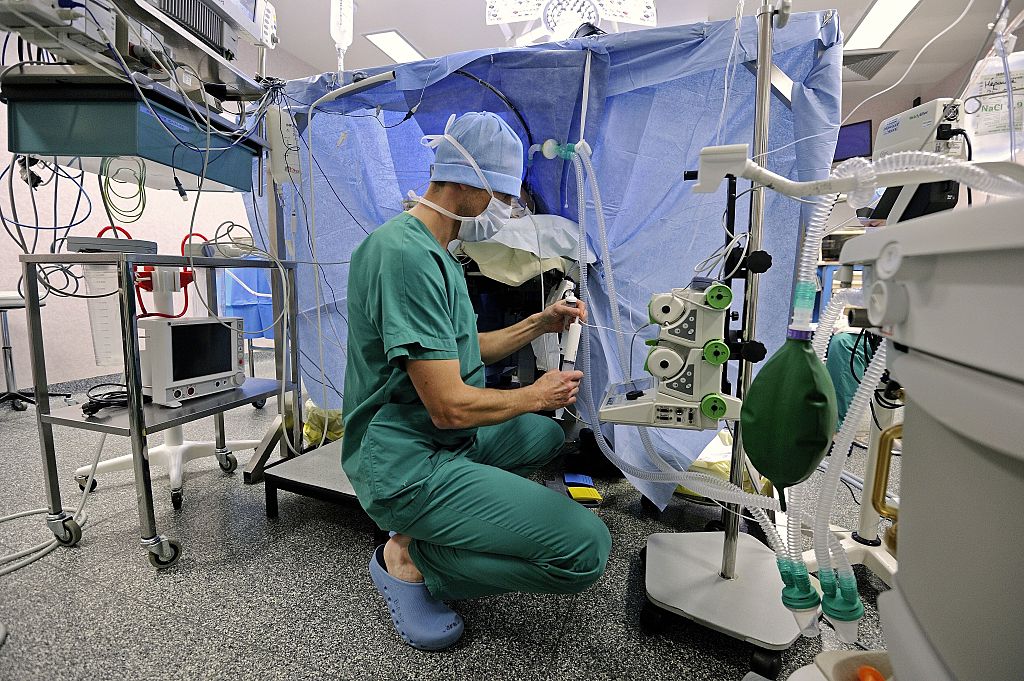excalibur
Diamond Member
- Mar 19, 2015
- 18,166
- 34,427
- 2,290
Just when you think the insanity can't get any worse, BAM!, they find another level.
This is madness, of course, phony climate science madness. They are making stuff up trying to 'out-green' each other.
According to a study, titled "Environmental Implications of Anesthetic Gases" published in Anesthesia Progress, inhalation anesthetic contributes to up to 0.1% of global carbon emissions.
Dr. Mohamed Fayed, a senior anesthetist at Henry Ford, said during the annual meeting of the American Society of Anesthesiologists that global warming is affecting lives every day, and reducing greenhouse gas emissions has become critical.
He noted that no matter how minor each consequence could be, they all add up. He urged anesthesiologists to make a big contribution to their cause by modifying their regular practice, like cutting back the flow of anesthetic gas without compromising the patient's care.
Based on the research, an hour of surgery with the inhaled anesthetic desflurane is comparable to driving up to 470 miles. Carbon dioxide is the major greenhouse gas that traps heat in the Earth's atmosphere and contributes to global warming.
While most general anesthetic operations need high fresh gas flow (FGF) at the start and finish of the surgery to obtain the desired effect rapidly, Dr. Fayed says it is safe and effective to reduce the flow for the duration of the process.
A 2022 article in the American Society of Anesthesiologists reports that anesthesiology is a carbon-intensive specialty that uses inhaled agents that contribute a lot of greenhouse gas emissions that in turn add to global warming. An atmospheric sampling of volatile anesthetics suggests that they are increasing and accounts for 5% of acute hospital carbon emissions.
Desflurane, sevoflurane, isoflurane, and halothane, which are used in general anesthesia, as well as nitrous oxide, are examples of relevant inhaled volatile anesthetics. Experts call on minimizing these agents' environmental consequences, especially desflurane which is substantially more expensive without evidence of therapeutic benefit of their use.
For the sake of climate change, researchers are urging surgeons to use less anesthetic on their surgical patients. Doctors at Henry Ford Health System in Detroit, Michigan, believe it has the potential to drastically cut the carbon footprint of hospitals in the United States.
...

 www.sciencetimes.com
www.sciencetimes.com
This is madness, of course, phony climate science madness. They are making stuff up trying to 'out-green' each other.
Anesthesia Gases Contribute to Global Greenhouse Gas Emissions
According to a study, titled "Environmental Implications of Anesthetic Gases" published in Anesthesia Progress, inhalation anesthetic contributes to up to 0.1% of global carbon emissions.
Dr. Mohamed Fayed, a senior anesthetist at Henry Ford, said during the annual meeting of the American Society of Anesthesiologists that global warming is affecting lives every day, and reducing greenhouse gas emissions has become critical.
He noted that no matter how minor each consequence could be, they all add up. He urged anesthesiologists to make a big contribution to their cause by modifying their regular practice, like cutting back the flow of anesthetic gas without compromising the patient's care.
Based on the research, an hour of surgery with the inhaled anesthetic desflurane is comparable to driving up to 470 miles. Carbon dioxide is the major greenhouse gas that traps heat in the Earth's atmosphere and contributes to global warming.
While most general anesthetic operations need high fresh gas flow (FGF) at the start and finish of the surgery to obtain the desired effect rapidly, Dr. Fayed says it is safe and effective to reduce the flow for the duration of the process.
A 2022 article in the American Society of Anesthesiologists reports that anesthesiology is a carbon-intensive specialty that uses inhaled agents that contribute a lot of greenhouse gas emissions that in turn add to global warming. An atmospheric sampling of volatile anesthetics suggests that they are increasing and accounts for 5% of acute hospital carbon emissions.
Desflurane, sevoflurane, isoflurane, and halothane, which are used in general anesthesia, as well as nitrous oxide, are examples of relevant inhaled volatile anesthetics. Experts call on minimizing these agents' environmental consequences, especially desflurane which is substantially more expensive without evidence of therapeutic benefit of their use.
For the sake of climate change, researchers are urging surgeons to use less anesthetic on their surgical patients. Doctors at Henry Ford Health System in Detroit, Michigan, believe it has the potential to drastically cut the carbon footprint of hospitals in the United States.
...

Less Anesthesia in Surgeries Could Reduce the Carbon Footprint of Hospitals, Experts Suggest
Doctors at Henry Ford Health System said that gasses used in anesthesia are harmful to the environment, and reduction of greenhouse gas emissions is crucial. Read the article to learn more details.






 .
.